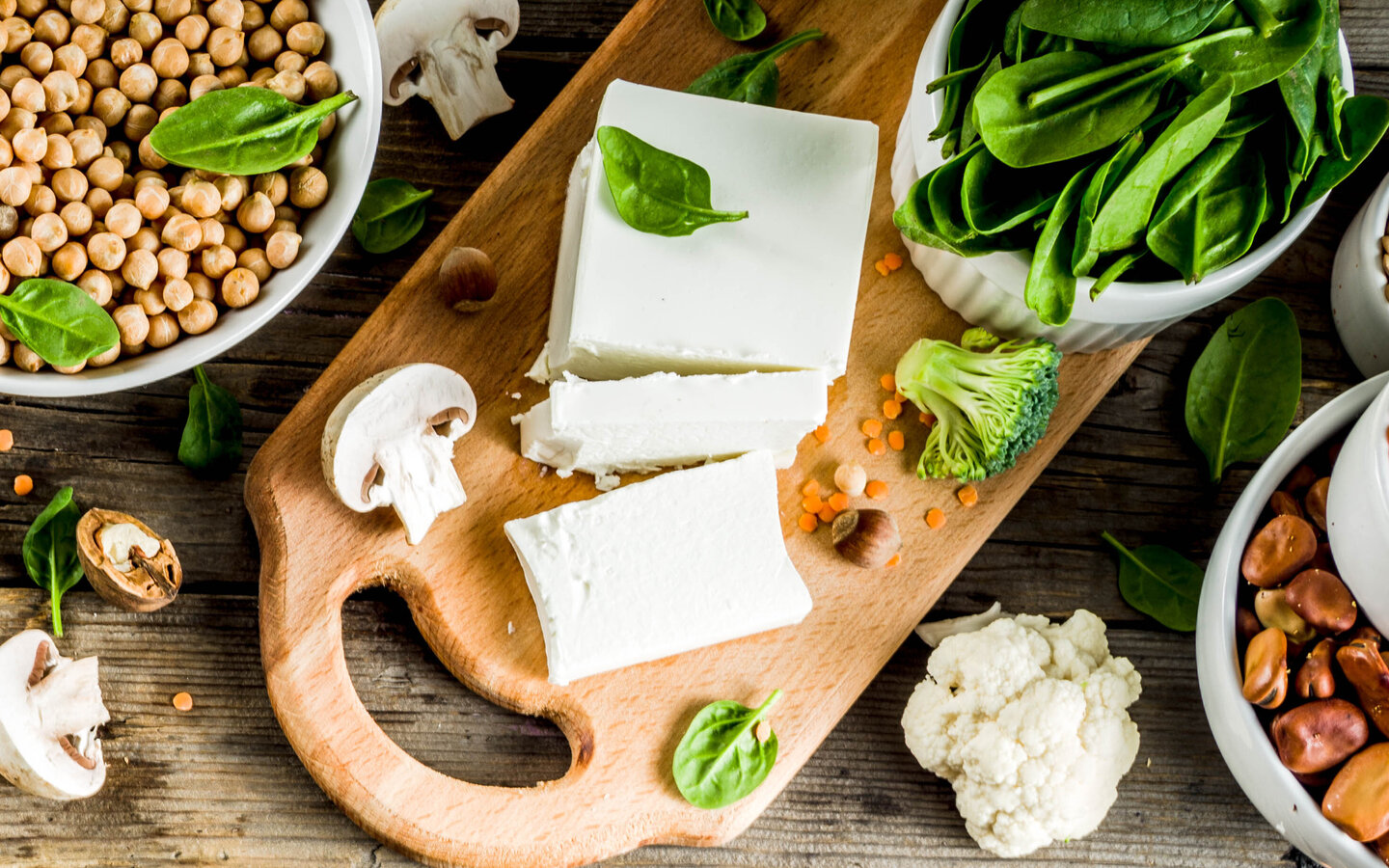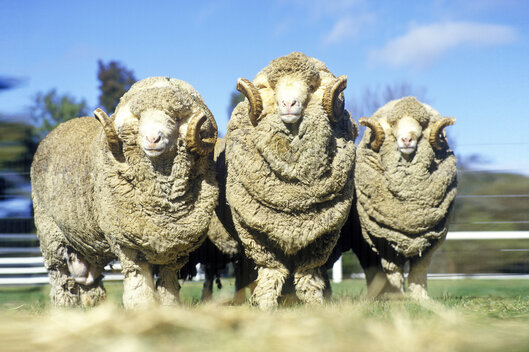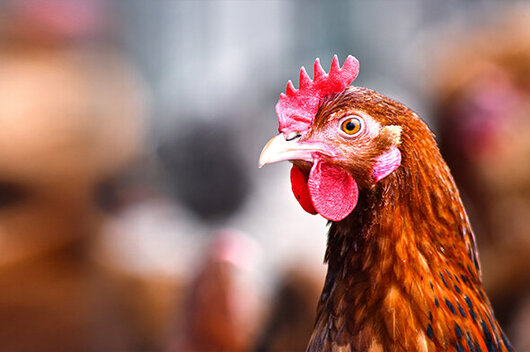Reasons and tips for a vegan dietVeganism means animal welfare
More and more people are interested in or opting for a vegan diet. But what is the motivation behind it? And what are the benefits of a vegan lifestyle? Here you will find the most important information about veganism.
Most people say that they like animals and don't want to cause them any suffering. At the same time, the majority consume meat, milk, cheese or eggs every day. Unfortunately, this does not fit together, as animals are exploited and suffer for these products. Vegans therefore exclude animal products from their everyday lives and regard farm animals as fellow creatures with feelings, needs and interests. At the heart of the vegan movement is the right of animals to a life in which they can live out their rights.
What is veganism?
The terms "veganism" and "vegan" have become increasingly mainstream in recent years. Behind the vegan attitude is the idea that no animal should be exploited for human consumption and the desire to protect them and give them a good life. That is why vegans try to avoid animal products in all areas as much as possible. This applies above all to nutrition. However, veganism goes beyond this. Vegans do not buy clothing made from leather, wool or fur, as animals die for these industries, nor do they buy cosmetics or other everyday products that contain animal ingredients.
Food in the vegan diet
What do vegans eat? No products of animal origin are included in their diet. This includes meat, fish, milk, eggs, cheese, honey and gelatine or products derived from these or used in the processing. They only eat plant-based foods such as fruit, vegetables, cereals, pulses and nuts. There are now also plenty of vegan meat, milk and yogurt alternatives based on oats, soy, almonds and pea or wheat protein that enrich vegan cuisine.
Vegan for the animals
There are many reasons why people choose veganism. However, the origin of the movement is clearly ethically motivated. It has been proven many times that animals are sentient. They have natural needs just like us humans. However, in agricultural husbandry, they are only given a short, usually painful life. They are not even able to meet their natural needs. Regardless of how they are kept, all farmed animals end up in the slaughterhouse. In Germany, over 750 million animals die every year for the consumption of animal products. In 2022, 52.2 million pigs, cattle, sheep, goats and horses and 701.4 million chickens, turkeys and ducks were slaughtered for animal products nationwide. Over two million animals are killed here every day.1 Worldwide, 80 billion land animals are slaughtered every year.2 In addition, around three trillion fish are caught in the wild and from aquacultures every year.3 Veganism is therefore the most consistent way to improve animal welfare.
In figuresThis is how many animals die every year for the consumption of animal products
Trillions of fish caught in the wild and in aquaculture die every year worldwide.
Billions of land animals are killed worldwide every year.
Millions of animals are slaughtered in Germany every year.
Millions of animal lives end up in slaughterhouses across Germany every day.
A vegan diet can be healthy
A healthy diet and veganism are often equated with each other. In fact, the vegan diet can be very healthy if you eat a whole plant-based diet. A balanced vegan diet consists of plenty of fruit, vegetables, wholegrain cereals, potatoes and plant-based protein sources such as tofu or pulses. The only thing vegans need to keep a close eye on is vitamin B12, which it is advisable to take in addition. However, a one-sided diet with predominantly vegan junk food and industrially processed products, which are now available in many vegan versions, is not healthier.
Meat and co. harm the environment
Farming animals is very damaging to the environment, as it takes up a lot of space and resources and produces greenhouse gases. Globally, the food system is responsible for a third of all greenhouse gases.4 Meat and other animal products are the main culprits within the food sector - around two thirds of emissions are attributable to them.5 In addition, the animal industry hardly fills people up: at 18 percent, it only accounts for a very small proportion of global calories.6 Around 40 percent of arable land worldwide is used to grow animal feed.7 This land could be used directly to grow food for humans.
Sources
² https://faunalytics.org/global-animal-slaughter-statistics-charts-2022-update
³ https://www.weiljedemahlzeitzählt.de/einherzfuerfische
⁴ Crippa, M., Solazzo, E., Guizzardi, D., Monforti-Ferrario, F., Tubiello, F. N., & Leip, A. (2021). Food systems are responsible for a third of global anthropogenic GHG emissions. Nature Food, 2(3), 198-209. doi.org/10.1038/s43016-021-00225-9.
Poore, J., & Nemecek, T. (2018). Reducing food's environmental impacts through producers and consumers. Science, 360, 987-992. https://www.science.org/doi/10.1126/science.aaq0216.
Parlasca, M. C., & Qaim, M. (2022). Meat Consumption and Sustainability. Annual Review of Resource Economics, 14(1). https://doi.org/10.1146/annurev-resource-111820-032340.
5 Parlasca, M. C., & Qaim, M. (2022) .
Springmann, M., Clark, M., Mason-D'Croz, D., Wiebe, K., Bodirsky, B. L., Lassaletta, L., de Vries, W., Vermeulen, S. J., Herrero, M., Carlson, K. M., Jonell, M., Troell, M., DeClerck, F., Gordon, L. J., Zurayk, R., Scarborough, P., Rayner, M., Loken, B., Fanzo, J., ... Willett, W. (2018). Options for keeping the food system within environmental limits. Nature, 562(7728), 519-525. doi.org/10.1038/s41586-018-0594-0.
Stehfest, E., Bouwman, L., van Vuuren, D. P., den Elzen, M. G. J., Eickhout, B., & Kabat, P. (2009). Climate benefits of changing diet. Climatic Change, 95(1-2), 83-102. https://doi.org/10.1007/s10584-008-9534-6.
6 Poore & Nemecek 2018
7 Parlasca & Qaim, 2022





